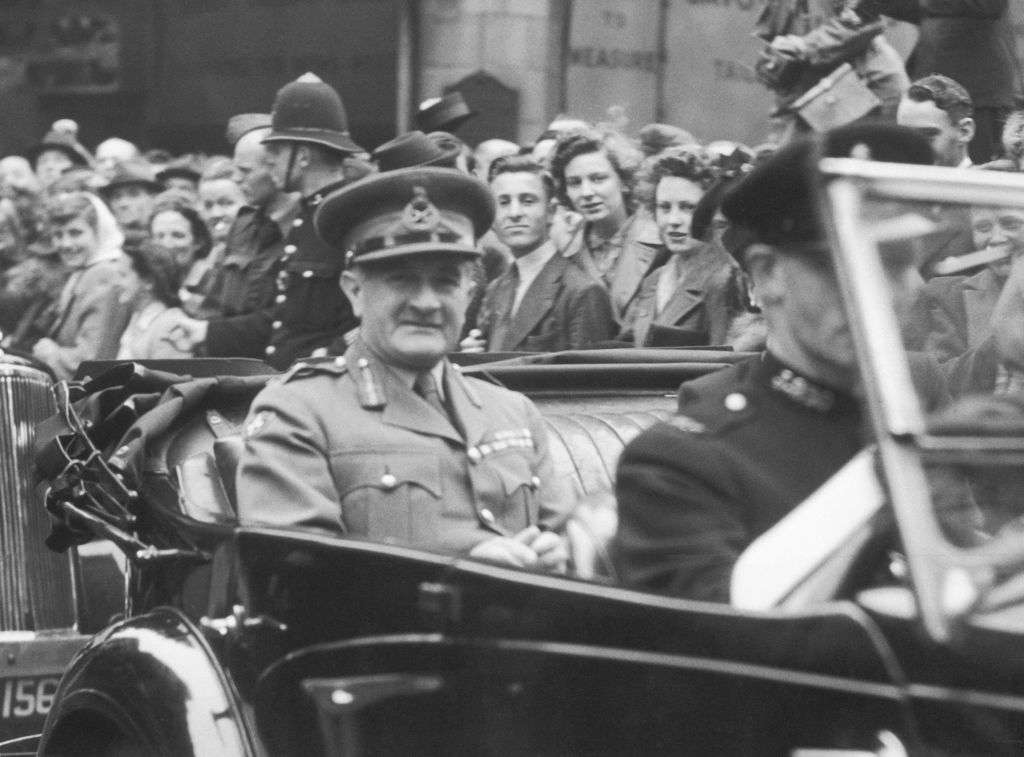Defeat into victory: the key to Next CEO Simon Wolfson's success
Next CEO Simon Wolfson claims he owes his success to a book on military strategy in World War II. What lessons does this book hold for business managers 80 years later, and how did Wolfson apply them to Next?

Get the latest financial news, insights and expert analysis from our award-winning MoneyWeek team, to help you understand what really matters when it comes to your finances.
You are now subscribed
Your newsletter sign-up was successful
Want to add more newsletters?
Simon Wolfson is widely regarded as the most able CEO of any FTSE-100 company. He joined Next, of which his father was then chairman, in 1991, was appointed to the board in 1997 at the age of 30 and took the top job in 2001. Next had been founded as a mid-market fashion retailer in 1981, but over-expanded and nearly went bust in 1988. Under Wolfson, it has expanded internationally, acquired other brands and gained a market value of £18 billion. He is well worth listening to.
When asked which business book he’d recommend, he replies, “Just one. Bill Slim’s Defeat into Victory”. This is the book, first published in 1956, by Field-Marshal William Slim about how he led the British 14th Army in the retreat through Burma in 1942; in the defence of India against a determined attack in 1944; and in the subsequent rout of the Japanese forces in Burma by June 1945. This was despite extraordinarily difficult terrain; being outnumbered, under-equipped and undersupplied; and the ferocity of Japanese defence. What lessons does this book hold for business managers 80 years later, and how did Wolfson apply them to Next?
Slim’s senior commanders were all people who he had got to know and trust years before, to whom he could delegate tasks with confidence. Similarly, Wolfson promotes internally, rather than recruiting from outside; 28 of his top 30 managers were promoted and have been at Next for a combined 500 years.
Try 6 free issues of MoneyWeek today
Get unparalleled financial insight, analysis and expert opinion you can profit from.

Sign up to Money Morning
Don't miss the latest investment and personal finances news, market analysis, plus money-saving tips with our free twice-daily newsletter
Don't miss the latest investment and personal finances news, market analysis, plus money-saving tips with our free twice-daily newsletter
Slim displays a determination to get on with, even like, notoriously difficult people on the same side. These included “Vinegar Joe” Stilwell, the American in command of Allied forces who served as Chiang Kai-Shek’s chief of staff; Orde Wingate, commander of the Chindits commandos, who did not regard Slim as his commanding officer; and Aung San, the Burmese nationalist leader. He also cultivated strong relations with the Americans, with the RAF and with Louis Mountbatten, the Allied commander in the Far East. The lesson for Wolfson? Learn not just to get on with, but also to respect and like the people you need in order to be successful.
Simon Wolfson's leadership style
Morale was critical to Slim’s success. “I made a point of speaking myself to every combatant unit, or at least to its officers... whether British, Indian, Gurkha or African. My platform was usually the bonnet of my jeep with the men collected around it and I often did three or four of these stump speeches in a day.” Wolfson too makes a point of visiting outlets, distribution warehouses, design centres and offices as often as possible.
Slim had an overarching strategy, but was prepared to be flexible if circumstances and dispositions changed. In fact, he regarded Japanese inflexibility as a key weakness, meaning that they would be thrown into confusion if the 14th Army did not respond as expected. Likewise, Wolfson emphasises his scepticism about an inflexible long-term strategy and the importance of being able to respond to changing circumstances. Hence, the acquisition of other brands such as Joules and Cath Kidston and expansion overseas when technology made it economic to do so.
Slim was very willing to acknowledge failure and recognise mistakes. He regarded it as important to learn lessons and move on; “the lessons from defeat are more than from victory. A defeated general will turn in upon himself and question the very foundations of his leadership, but if he is to command again, he must shake off these regrets as they claw at his will and self-confidence”. Wolfson is never publicly flustered and always willing to admit to setbacks.
He admires Slim for his willingness to retreat, as he did before the Japanese offensive in 1944, rather than stubbornly defend a poor position. The result was a mixture of caution and boldness: “when in doubt about two courses of action, a general should choose the bolder”, he writes. A CEO should too.
Wolfson probably hasn’t had to improvise to overcome shortages in the way Slim did: he had river craft built, roads constructed and even parachutes made out of jute to overcome the lack of silk and special cloth. Supply problems were a challenge to be overcome, not an excuse for inaction. Wolfson can probably supply comparable anecdotes. Like Slim, he sets great store by intelligence; in Burma, it was a question of the location and condition of Japanese troops; for Wolfson it is gauging how the market is developing and changing.
But the most important aspect both leaders share is their regard for the importance of logistics. For Slim, this was the supply of food, fuel and ammunition, maintenance of vehicles and treatment and evacuation of the wounded. Much of the logistics in 1944-1945 was airborne, which meant control of the skies, building forward airfields and the accumulation and distribution of stores. The inadequacy of their logistics was why Japanese casualties were so much higher.

General Sir William Slim
For Wolfson, logistics means managing supply chains, the distributions to stores, handling of returns and integration of service all along the chain. You might think that wars are won on the battlefield and retail success at the point of sale, but without good logistics, generals and retail CEOs fail. Slim focused on the whole army, not just the frontline troops. “Everyone in the army had to be made to see where his task fitted into the whole”. The same applies in any business.
Slim combines intense regard, liking and loyalty towards those on his side with disdainful ruthlessness towards the Japanese. Perhaps Wolfson has a similar attitude to those who cross him in business, but any potential enemies would be well advised not to find out.
After the war, Slim went on to become chief of the Imperial General Staff and governor-general of Australia. He was a highly regarded lecturer on leadership and died in 1970. If Wolfson ever writes a management book, it too will be well worth reading.
This article was first published in MoneyWeek's magazine. Enjoy exclusive early access to news, opinion and analysis from our team of financial experts with a MoneyWeek subscription.
Get the latest financial news, insights and expert analysis from our award-winning MoneyWeek team, to help you understand what really matters when it comes to your finances.

Max has an Economics degree from the University of Cambridge and is a chartered accountant. He worked at Investec Asset Management for 12 years, managing multi-asset funds investing in internally and externally managed funds, including investment trusts. This included a fund of investment trusts which grew to £120m+. Max has managed ten investment trusts (winning many awards) and sat on the boards of three trusts – two directorships are still active.
After 39 years in financial services, including 30 as a professional fund manager, Max took semi-retirement in 2017. Max has been a MoneyWeek columnist since 2016 writing about investment funds and more generally on markets online, plus occasional opinion pieces. He also writes for the Investment Trust Handbook each year and has contributed to The Daily Telegraph and other publications. See here for details of current investments held by Max.
-
 Review: Pierre & Vacances – affordable luxury in iconic Flaine
Review: Pierre & Vacances – affordable luxury in iconic FlaineSnow-sure and steeped in rich architectural heritage, Flaine is a unique ski resort which offers something for all of the family.
-
 Could you get cheaper loans under ‘significant’ FCA credit proposals?
Could you get cheaper loans under ‘significant’ FCA credit proposals?The Financial Conduct Authority has launched a consultation which could lead to better access to credit for consumers and increase competition across the market, according to experts.
-
 8 of the best properties for sale with minstrels’ galleries
8 of the best properties for sale with minstrels’ galleriesThe best properties for sale with minstrels’ galleries – from a 15th-century house in Kent, to a four-storey house in Hampstead, comprising part of a converted, Grade II-listed former library
-
 The rare books which are selling for thousands
The rare books which are selling for thousandsRare books have been given a boost by the film Wuthering Heights. So how much are they really selling for?
-
 How to invest as the shine wears off consumer brands
How to invest as the shine wears off consumer brandsConsumer brands no longer impress with their labels. Customers just want what works at a bargain price. That’s a problem for the industry giants, says Jamie Ward
-
 The downfall of Peter Mandelson
The downfall of Peter MandelsonPeter Mandelson is used to penning resignation statements, but his latest might well be his last. He might even face time in prison.
-
 In defence of GDP, the much-maligned measure of growth
In defence of GDP, the much-maligned measure of growthGDP doesn’t measure what we should care about, say critics. Is that true?
-
 A niche way to diversify your exposure to the AI boom
A niche way to diversify your exposure to the AI boomThe AI boom is still dominating markets, but specialist strategies can help diversify your risks
-
 New PM Sanae Takaichi has a mandate and a plan to boost Japan's economy
New PM Sanae Takaichi has a mandate and a plan to boost Japan's economyOpinion Markets applauded new prime minister Sanae Takaichi’s victory – and Japan's economy and stockmarket have further to climb, says Merryn Somerset Webb
-
 Early signs of the AI apocalypse?
Early signs of the AI apocalypse?Uncertainty is rife as investors question what the impact of AI will be.
